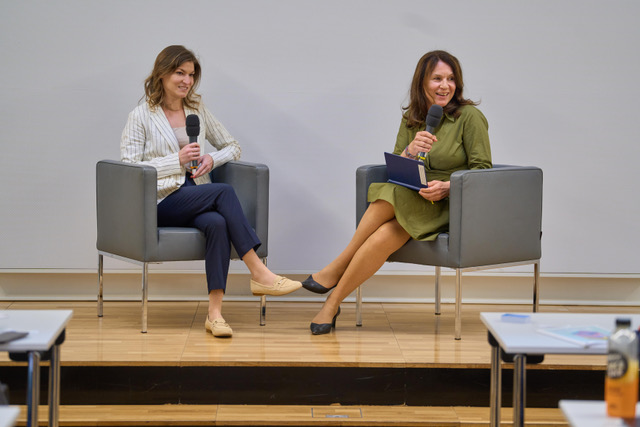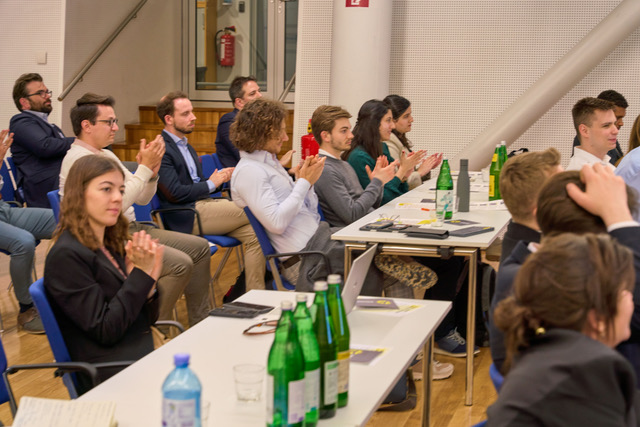
In time of rising protectionism and growing skepticism toward international institutions, the World Trade Organization (WTO) finds itself at a critical crossroad. As the WTO marks its 30th anniversary, Barbara Tasch-Ronner, Board Member at United Europe, sat down with Danai Budas, Deputy Director, International Relations and Markets at the Federation of Austrian Industries (IV) to explore why this institution remains essential – especially for small, export-oriented economies like Austria’s. In the interview, they discussed the benefits of multilateral trade, the challenges of global cooperation, and why reform and renewed commitment are urgently needed.
Barbara Tasch-Ronner: Why do we need a Multilateral Trade Organization like the WTO – and what are the benefits for companies?
Danai Budas: From a business perspective, and speaking in my capacity as a representative of the Federation of Austrian Industries (IV), it is clear that companies fundamentally depend on open markets.
Austria is a small, export-driven country – approximately 60% of our GDP is generated through exports. Therefore, access to international markets is essential to our economic prosperity.
Many people may not fully appreciate the benefits the WTO provides, simply because they have become accustomed to them. One of the core principles of the WTO is non-discrimination – offering equal terms of trade to all member states. Currently, around 74% of global trade is conducted under WTO rules. That figure alone highlights the vital role the organization plays.
Studies conducted by the Kiel Institute for the World Economy and the IFO Institute illustrate the potential impact if the WTO were to cease functioning. They show that such a scenario would result in a highly fragmented global trade system. In the short term, Germany’s GDP could drop by 3%, and China’s by as much as 6%. These findings underscore the WTO’s importance in maintaining global economic stability.
Barbara Tasch-Ronner: 30 Years of the WTO – Is there Reason to Celebrate?
Danai Budas: The WTO marks its 30th anniversary this year, a significant milestone since its founding in 1995. It has played a key role in shaping economic globalization and facilitating international trade. However, it has also encountered major challenges: trade wars, increasingly complex supply chains, persistent conflicts between industrialized and developing nations, and a pressing need for reform.
The last major reform – the agreement on fisheries subsidies aimed at curbing overfishing – was important, but from an industrial perspective, many unresolved issues remain. Reaching consensus among 166 members is undeniably difficult. Yet, the fact that countries continue to apply for WTO membership demonstrates its enduring relevance.
Despite its imperfections the WTO remains a cornerstone of the global trading system. And that, in itself, is a reason for cautious optimism.
Barbara Tasch-Ronner: What are the main challenges for the WTO?
Danai Budas: One of the biggest challenges – and at the same time, one of the biggest opportunities – is the WTO’s diverse membership. With 166 member states, each representing different economies, interests and political systems, reaching consensus is incredibly complex. Nevertheless, the fact that all these countries still sit down at the same table to work toward compromise shows the enduring strength of multilateralism – even at a time when it’s under pressure globally.
We also need to acknowledge that even bilateral trade agreements often take five to six years to finalize. So it is only natural that multilateral negotiations, involving many more actors, require time and patience.
Barbara Tasch-Ronner: What about the current pressure on global trade – especially from the US?
Danai Budas: Yes, these are difficult times for global trade. The threat of new tariffs and the broader attack on multilateral trade by President Trump have been particularly damaging. However, as the current Director-General of the WTO has emphasized, these challenges actually underline the importance of having a functioning multilateral trade system.
particularly damaging. However, as the current Director-General of the WTO has emphasized, these challenges actually underline the importance of having a functioning multilateral trade system.
These are real concerns that the US has not paid its membership contributions since 2024. Being the largest single contributors to the WTO budget, this poses a significant threat. The US is a major economy and often prefers bilateral agreements where it has a stronger negotiation position – but that is precisely why the WTO matters: to give smaller countries a platform and a voice in global trade.
I sincerely hope the US will remain part of the WTO. Even it doesn’t, the organization will continue to exist – and it will remain relevant. But yes, it would be considerably less effective without US participation.
Barbara Tasch-Ronner: What about the Appellate Body deadlock – can the dispute settlement be restored?
Danai Budas: That’s one off the most pressing issues. The Appellate Body – essentially the WTO’s highest dispute settlement panel – hasn’t been operational since 2019 due to a US blockade of new judge appointments. This system has been referred to as the “crown jewel” of the WTO because it ensures that rules are actually enforced.
The US argues that rulings have interfered with its sovereignty – and in some respects these concerns are valid. We need to engage with them, understand their point of view, and use that as starting point for negotiation. The EU and like-minded partners such as Australia, Canada, and notably China have already put in place a temporary workaround through plurilateral agreements to handle disputes.
But in the long term, the WTO must restore the full functionality of the Appellate Body. Without it, appeals go into a legal void – which weakens the entire system.
Barbara Tasch-Ronner: What needs to be done to bring the WTO back in shape?
Danai Budas: Reform is essential if the WTO wants to stay relevant in today’s global economy. One key area is fair competition. Since 1995, the world has changed dramatically, and many new members have joined the WTO. A country like Austria, for instance, struggles to compete fairly with heavily subsidized Chinese carmakers in third markets.
The EU has strict aid rules, while others do not play by the same standards. The WTO does have rules on subsidies – but they are often not properly enforced. Steel is another example where global overcapacities, combined with tariffs, are fueling tensions.
Plurilateral agreements may be a more pragmatic path forward in the short term, but we still hope to eventually find broader consensus on core issues.
Q&A
 Would the WTO still function without the US, and why should smaller countries remain part of it? Technically, yes – the WTO would continue to exist without the US. But it would lose much of its weight and influence. That said, it’s also not realistic to assume the US will fully withdraw. Leaving the WTO would mean that the US has to renegotiate all its trade agreements with 166 countries – a massive and costly undertaking that could take years.
Would the WTO still function without the US, and why should smaller countries remain part of it? Technically, yes – the WTO would continue to exist without the US. But it would lose much of its weight and influence. That said, it’s also not realistic to assume the US will fully withdraw. Leaving the WTO would mean that the US has to renegotiate all its trade agreements with 166 countries – a massive and costly undertaking that could take years.
What about tariffs and global supply chains – are these threats real or just political theater? Supply chains today are deeply interconnected. Over the past 50 years, trade logistics have become incredibly complex – a car, for example, may cross borders several times during assembly. In the US, a single vehicle might pass through US and Mexican customs seven times before its completed.
This complexity makes it extremely difficult to implement tariffs in a meaningful way without causing unintended damage. That’s why I see many of these tariff’s threats more as negotiation tactics. They are used to apply pressure and force the other side to make concessions.
In that sense, tariffs often serve as a tool to open talks – not necessarily as long term policy.
The interview was conducted as part of the Young Leaders Seminar on April 30, 2025, in Vienna. You can view the full seminar here. We thank Barbara Tasch-Ronner and Danai Budas for their participation.



